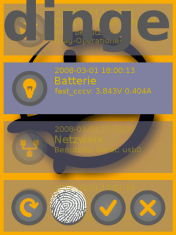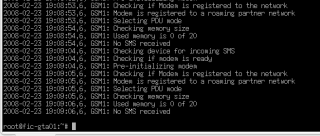Mar
8
How long does yours stay up?
16 years ago, mid-March | 6 Comments
Ok, we all know that the Neo 1973 GTA01 power management isn’t quite there yet but we’ve had the recent good news that NXP have made the user manual available for the PCF50633;
“We have carefully reconsidered how to best serve the OpenMoko community in supporting our PCF50633 product, and our decision has been to allow you to publish the full User Manual on the OpenMoko website. This is more effective for the development community then having to reference to 2 documents, being the DS already sent to you and the addendum containing the register description. We therefore prefer that the full UM get’s published. The Company Confidential notice has been removed. We hope to see the successful application of our device and hope to see many OpenMoko products in the market, using our PCF50633.”
So really, we should have hundreds of pairs of eyes looking at this for the GTA02. Anyway, in the meantime I’ve been testing out a little battery pack,  supplied by Portable Power Supplies in the UK, which is charged and charges via USB ports. Just the ticket for the Neo GTA01. The unit takes an initial, approximate 6 hours to charge and can be done from a standard USB port on a desktop or laptop. There is also a wall charger available but this obviously bumps up the price. Once charged the unit will happily sit there for months at a time doing nothing, which makes for a good emergency backup. Of course the battery pack will not indicate to the Neo that it can do fast charging but it is capable of doing so – indeed it can serve up a healthy 700ma – but that problem is solved by Bobby Martin (wurp2 irc nick) who has produced a python application to help out. This little application allows you to force the Neo to do fast charging (draw 500ma). Obviously by doing this you override the safety checks, but as I already know that the battery pack is capable of serving more than the Neo will take there’s really no risk here. So far my Neo has been running off it for more than 24 hours and I’d expect it to go on for a lot longer too. This is going to mean that I don’t have to turn off my Neo to save power, especially when I do those overnight trips to and from The Netherlands. I’ll update here when the battery eventually dies, I’m expecting at least 3 or 4 days but we’ll see.
supplied by Portable Power Supplies in the UK, which is charged and charges via USB ports. Just the ticket for the Neo GTA01. The unit takes an initial, approximate 6 hours to charge and can be done from a standard USB port on a desktop or laptop. There is also a wall charger available but this obviously bumps up the price. Once charged the unit will happily sit there for months at a time doing nothing, which makes for a good emergency backup. Of course the battery pack will not indicate to the Neo that it can do fast charging but it is capable of doing so – indeed it can serve up a healthy 700ma – but that problem is solved by Bobby Martin (wurp2 irc nick) who has produced a python application to help out. This little application allows you to force the Neo to do fast charging (draw 500ma). Obviously by doing this you override the safety checks, but as I already know that the battery pack is capable of serving more than the Neo will take there’s really no risk here. So far my Neo has been running off it for more than 24 hours and I’d expect it to go on for a lot longer too. This is going to mean that I don’t have to turn off my Neo to save power, especially when I do those overnight trips to and from The Netherlands. I’ll update here when the battery eventually dies, I’m expecting at least 3 or 4 days but we’ll see.
update: at about 4am this morning the Neo had managed to suck the life out of the battery pack and its own battery. This is horrific, showing just how thirsty a Neo is. The total time ended up at about 30 hours, but I’m going to rerun the test to be sure.
update 2: I’ve repeated the test 2 more times now and the results are very similar, sadly.

Tagged with: hardware • neo 1973 • openmoko
March 8, 2008 23:51
Mar
2
Boost your project with FUD
16 years ago, at the start of March | 1 Comment
I recently read quite a bit of FUD and really felt that it was worth comment even if only as a counter to the points made when someone Google’s the Neo 1973 / Openmoko. I’ll take on each of the points made and correct what is needed. Oh, and just for the record, this text represents my opinions – no-one else’s.
“First of all OpenEmbedded based systems are harder to build, due to the dependency of monotone and the properitary, OE-only, bitbake, and then even another MokoMakefile build wrapper.”
First of all any system that you know nothing about it hard to use. The use of monotone is not an issue, I use a version just for building my OE stuff. Calling bitbake propriatory is like suggesting that every kernel module is propriatory. Bitbake is used to ‘bake’ (make) the recipes (.bb files) and is “derived from Portage, which is the package management system used by the Gentoo Linux distribution.” The source is freely available at berlios – why is there an issue here? It also appears that this author doesn’t understand the role that the MokoMakefile plays. The MokoMakefile was developed by Rod Whitby to help people who are new to OE and OM build and setup it is not part of Openmoko or OpenEmbedded. Really, if they had even bothered to read the wiki entry for it they would have seen this. I guess it’s easier to spout bile than be accurate.
“OpenMoko also is glibc and sysvinit based…”
Ok, I’ll let this slide since it’s true and just the author’s opinion on what is or is not suitable. I’ll come to the speed issue later.
“Forthermore OpenMoko comes with custom Gtk+ widgets and custom Moko libraries and applications, where Gtk+ PDA / phone applications are already available”
For a start “So what?”. Are you suggesting that no one develops anything that already exists? Should we have one email application, one word processor? What about one operating system? Clearly that gripe at Openmoko is just irrelavant. Furthermore you can actually build gpe applications for the Openmoko platform if you want. Take a quick look at what’s installed and you’ll even see that gpe-scap – what we use for screenshots is installed by default.
“yet another Gtk+ PDA / phone application stack equals reinventing the wheel.”
Actually, this is how progress is made. Take a look at the recent work on the moko underground stuff for an example. What’s more in the very next paragraph…
“We therefore started to create a saner, smaller, fully functional T2 based target”
So you decided to reinvent the wheel? Now to your bullet points
“T2 based, no bitbake…”
So you swapped one ‘propriatory’ build system for another?
“uClibC based, frees your phone’s…”
This, we agree on, but it does make building applications outside the tree a lot easier to not use uclibc.
“not sysvinit, bootup in less than 2 minutes…”
My Neo boots in less that 2 minutes all the time.
“GPE based GUI, to re-use existing applications…”
Did you actually write anything yourself then?
“focus on UI functionality early, no endless tinkering and rewriting, “
Wow, someone who writes perfect code and a perfect interface straight off! Oh, wait.. you’re actually using other people’s code so you’re not really doing anything yourself.
“includes just one embeded scripting language…”
Openmoko doesn’t include a scripting language by default, unless you count the shell, but you can install any number of them – including lua.
“just one… …webkit.”
Openmoko uses webkit.
Nothing you have said would inspire me to even take a look at your ‘T2 based’ project, least of all your attitude. Your main gripe seems to be that FIC didn’t use your T2 build system – that and a belief that everything not written by you is crap, as evidenced by your faq.

Tagged with: google • linux • neo 1973 • openmoko
March 2, 2008 15:18
Mar
1
The underground bubbles to the surface
16 years ago, at the start of March | 2 Comments
Mickey Lauer recently told us about some interesting developments presented at FOSDEM. More work has taken place and images can now be built – so as always that’s what I’m going to do. I’ll add this to my regular building regime – although the rate of change in this image will probably be a little slower than the main Openmoko and ScaredyCat images . The first one has already been uploaded to my buildhost so you can test it out for yourself right now. Please remember that although it works and you can make and receive calls this is experimental stuff. As long as you bear this in mind everyone will be happy.
already been uploaded to my buildhost so you can test it out for yourself right now. Please remember that although it works and you can make and receive calls this is experimental stuff. As long as you bear this in mind everyone will be happy.
There’s an awful lot of work gone into this by emdete (irc nick) for which he should be congratulated. Not only is it a working prototype but he has been thinking outside the box – more of this is needed for new opensource devices to make it in the marketplace. I’ve chatted to emdete on irc and he is aware of some of the shortcomings of this first release. Primarily he was keen to get a working version to demonstrate at FOSDEM, which makes sense. In the future we can look forward to a more modular approach and of course, for those of us who don’t speak German, localization.
These new images also serve as a test-bed for Mickey Lauer’s gsm mux daemon which, wonderfully, has a dbus interface, something I really would like to see in all the daemons in Openmoko.

Tagged with: image builds • neo 1973 • openmoko • opensource
March 1, 2008 21:00
Feb
23
Neo 1973 as an SMS gateway
16 years ago, at the end of February | Leave a Comment
Builds have been broken again recently, for about 5 days or so due to this,
../../libkoto/libkoto.a(koto-task-view.o): In function `on_note_activated’:
/builder/newBuild/build/tmp/work/armv4t-angstrom-linux-gnueabi/
openmoko-tasks2-0.1.0+svnr379-r1/trunk/libkoto/koto-task-view.c:261:
undefined reference to `koto_platform_edit_task’
(just in case someone feels the need to fix it – hint hint )
but that has given me a chance to start poking about with other things. One of those things happened to be smstools3. SMS Server Tools 3 (smstools3) can take  an ordinary phone or gsm modem and turn it into an SMS gateway that can send and receive SMS messages. Now, I don’t have a gsm modem but I do have a Neo 1973. Within 5 minutes I had SMS Tools compiled using the Openmoko toolchain. I’ve taken to using the toolchain quite a bit for testing before I create the .bb files so I can do proper building. Once I’d got a compiled smsd, I put together a simple /etc/smsd.conf file for the Neo (listed below).
an ordinary phone or gsm modem and turn it into an SMS gateway that can send and receive SMS messages. Now, I don’t have a gsm modem but I do have a Neo 1973. Within 5 minutes I had SMS Tools compiled using the Openmoko toolchain. I’ve taken to using the toolchain quite a bit for testing before I create the .bb files so I can do proper building. Once I’d got a compiled smsd, I put together a simple /etc/smsd.conf file for the Neo (listed below).
devices = NEO logfile = /var/log/smsd.log loglevel = 6 outgoing = /var/spool/sms/outgoing checked = /var/spool/sms/checked failed = /var/spool/sms/failed incoming = /var/spool/sms/incoming [NEO] device = /dev/ttySAC0 baudrate=115200 incoming = yes regular_run_interval=3600 regular_run_cmd=AT+CFUN=1 regular_run_cmd=AT+COPS pin = 1234
Obviously the /var/spool/sms directories needed to be created too. Before you start up smsd though you need to kill off gsmd by simply issuing the command
/etc/init.d/gsmd stop
gsmd will then stop and, from what I gather, power off the gsm chip. This bit is fairly important to know, since you actually need the chip to be powered up. We can do this simply by using the command
echo 1 > /sys/devices/platform/neo1973-pm-gsm.0/power_on
smsd can then be started, if you want to stop it forking use the -t switch on the command line. Incidentally, if you want to use the regular_run_xxx commands in your configuration you need to use the latest beta of smstools3. I needed to use them to get the Neo to register with the network, particularly as I’m actually roaming while doing this. To send an sms you simply copy a text file into the /var/spool/sms/outgoing directory – The format of the file in its simplest form is
To: destination-number message-text
That’s its most basic form, you can get much more complex. There are some very nice features in smstools particularly that you can trigger actions on the receipt of SMS messages.

Tagged with: linux • neo 1973 • openmoko
February 23, 2008 22:56
Feb
13
No gpsd dependency in ScaredyCat images
16 years ago, mid-February | 2 Comments
I’d noticed that one of the developers had added a dependency on gpsd to the image build. Unfortunately gpsd depends on python-ncurses when you use –python in the build. While I’m sure they tested first, there is no .bb for python-ncurses in oe dev. Since this is preventing me building I am removing the dependency on gpsd from my builds. This allows me to build as normal. It is also preventing the build of gpsd but older versions should still work.
This should only affect people who build from oe dev and not the om version and should be fixed at some point. Although I am unsure as to why Openmoko is depending on gpsd anyway, at least at this stage.
Update: This should now be fixed. I’ll be rebuilding today’s build and making them available soon (busybox currently broken). Thanks go to

Tagged with: image builds • openmoko • opensource • software
February 13, 2008 14:23
Current Electricity Use (15min)
iPhone/Webkit RSS Reader
Links
- automated home
- Automated It Technology News
- awooga!!!
- LinITX
- My Acer page
- My Asterisk pages
- My Work in progress (old)
- Noble Race Car
- openmoko / neo 1973 wiki
- planet openmoko
- Spadgecock Cumpants
Tags
1-Wire android api Apple arduino currentcost DDAR development DVD FIC freerunner G1 google Google Phone gphone gprs GPS hardware image image builds inspiration iphone jailbreak kiosk linux Mac monitoring Music neo 1973 Nokia openmoko opensource OSX Pachube personal qtopia rhubarb rikki Rio slimp3 slimserver software tracking Trolltech u-bootTwitpic
Graphy Stuff





 ..the cat came back..
..the cat came back..